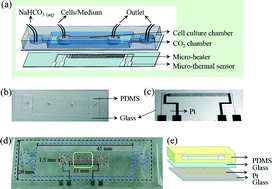A portable microfluidic device for the rapid diagnosis of cancer metastatic potential which is programmable for temperature and CO2†
Abstract
If metastasis of lung cancer can be found and treated early, a victim might have an improved chance to prevail over it, but routine examinations such as chest radiography, computed tomography and biopsy cannot characterize the metastatic potential of lung cancer cells; critical diagnoses to define optimal therapeutic strategies are thus lost. We designed a portable microfluidic device for the rapid diagnosis of cancer metastatic potential. Featuring a micro system to control temperature and a bicarbonate buffered environment, our device discriminates a rate of surface detachment as an index of the migratory ability of cells cultured on pH-responsive chitosan. We labeled metastatic subpopulations of lung cancer cell lines, and verified that our device is capable of separating cells according to their metastatic ability. As only few cells are needed, a patient's specimen from biopsies, e.g. from fine-needle aspiration, can be processed on site to offer immediate information to physicians. We expect that our design will provide valuable information in pre-operative evaluations to assist the definition of therapeutic plans for lung cancer, as well as for metastatic tumors of other types.


 Please wait while we load your content...
Please wait while we load your content...